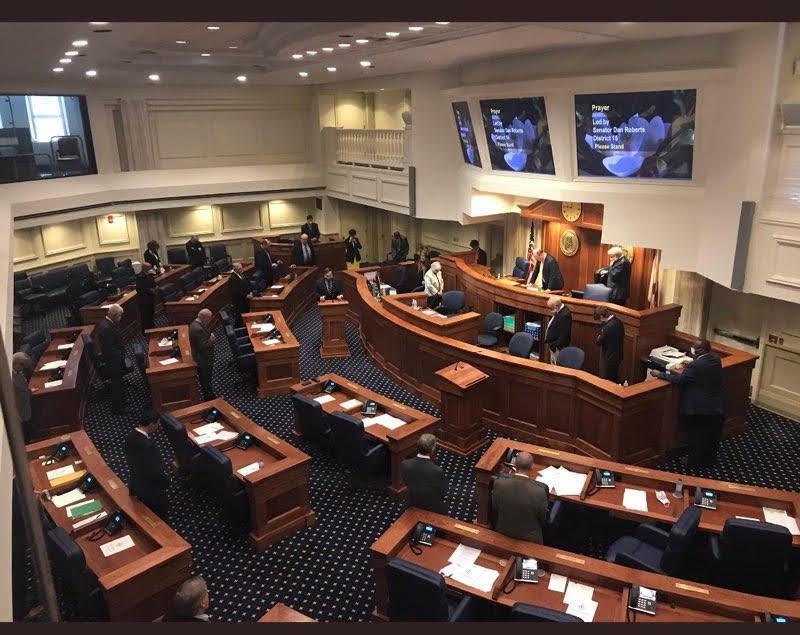By Brandon Moseley
The Alabama State Senate met for Day One of the second 2021 special session, called by Alabama Governor. Kay Ivey (R) to address constitutionally mandated decennial redistricting.
The redistricting has to be completed before the 2022 elections.
The Governor has also asked the legislature to appropriate some of the American Rescue Act dollars that the state received from the federal government be spent on aid for healthcare providers, particularly hospitals and nursing homes.
Sen. Jabo Wagoner (R-Vestavia), the Senate Rules Committee Chairman, asked the Senate to pass resolutions announcing to the House of Representatives that the Senate was now in session as well as a joint resolution establishing a committee to formally notify the governor that the legislature is in session. Both of those measures passed the body.
The State Senate met for 24 minutes to accept bills and resolutions, and open the journal so that members can introduce bills. State Sen. Rodger Smitherman (D-Birmingham introduced legislation to postpone implementation of the controversial Alabama Literacy Act, and Sen. Arthur Orr (R-Decatur) announced that he has drafted two bills to address the COVID-19 vaccine mandates.
The Day One meeting of the Senate was brief, but by law, the legislature cannot address bills on the same day they are filed. This gives the members time to review the bills and for the public to look up the bills and contact their legislators prior to action on a piece of legislation.
During a special session, it requires a super majority of two-thirds vote of both Houses for the legislature to consider legislation that was not in the governor’s call. Since school legislation and banning vaccine mandates were not in the governor’s call, these and other measures would require those super majority votes to be considered.
The legislature will consider four redistricting plans in the next week. One is for the Alabama congressional districts, the second is for the state board of education, the third is for the Alabama Senate, and the fourth is for the Alabama House of Representatives. The redistricting plans were prepared by the Legislative Committee on Reapportionment, which is chaired by State Sen. Jim McClendon (R-Springville) and State Rep. Chris Pringle (R-Mobile).
Smitherman's bill would postpone the Alabama Literacy Act for two years.
“I introduced a bill to delay the holding back of our third graders," Smitherman said. “If you kept up with the school board meeting, the experts and principals said we had to have more time.”
The Alabama Literacy Act was a reform measure that the legislature adopted and Gov. Ivey signed. The legislation orders every public school third grader in the state that is not in special education and that tests as reading below the third grade level, in end of year standardized testing, to repeat the third grade, regardless of their classroom grades. This landmark legislation is currently set to go into effect at the end of the 2021/2022 school year.
“About 60% of our students would have failed third grade” if this had been in place this year, Smitherman told the body.
Alabama consistently tests as having the worst performing public school students in the nation. Alabama ranked 52 out of 52 systems in the nation (including Washington D.C. and Defense Department school system). Alabama’s fourth graders scored 46th in reading and last in math during the last year for of reliable data, pre-pandemic.
The Alabama Literacy Act also establishes resources and extra help for students who are struggling in school. Because of forced closures due to the COVID-19 pandemic and interruptions of classroom activity for both students and teachers, normal instruction was limited, as was the promised extra help.
Smitherman introduced and passed similar legislation delaying implementation of the Literacy Act during the 2021 regular session; but Ivey vetoed it when it reached her office.
“They said then that we did not have the data,” Smitherman said. “Now we have the data.
“I would like to get that to the House and get that to the governor. Thank you for your vote last time. I hope that we do not lose a generation of kids because of COVID-19.”
Many education reform advocates have urged that the state interject competition in education by dramatically increasing school choice options, by approving more public charter schools or going to a voucher system where education dollars follow the student to the school that the parent chooses for their child to attend.
Orr's two bills address the COVID-19 vaccine mandates. He had them ready in print form for other Senators to review to see if they want to join as original cosponsors.
Orr said thousands of Alabamians are facing pending terminations because they have refused to get the COVID-19 vaccine. President Joe Biden (D) has ordered millions of Americans to get vaccinated, whether they want to or not. Many of the Alabamians who are refusing to comply with the President’s orders are asking the state to intervene on their behalf. Whether or not a piece of state legislation can block any federal order is a dubious proposition constitutionally. Ivey and Alabama Attorney General Steve Marshall (R) are suing the Biden administration in federal court to block the mandates, but that future court decision, which likely will be appealed all the way to the U.S. Supreme Court, will likely arrive too late to protect workers from employer mandated deadlines which are already being reached.
State Sen. Shay Shelnutt (R-Trussville) said, “I would like to take a moment to thank my Senate colleague Sen. McClendon. He even bought a house so he wouldn’t have to go back and forth to Springville as much. Thank you, Sen. McClendon for all of the hard work you have done. This does not go without notice.”
The Senate joined Sen. Shelnutt in a round of applause for Sen. McClendon.
The Alabama Senate will meet for Day Two of the 2021 special session at 9:00 a.m. Friday.










